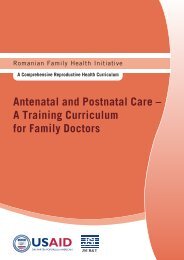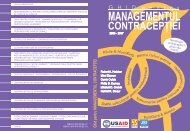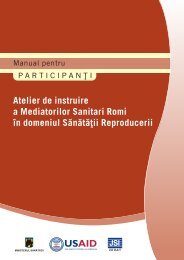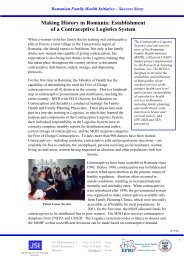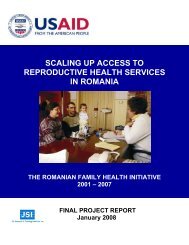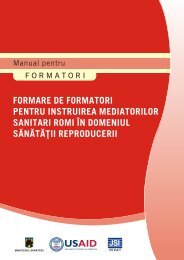Training of Roma Health Mediators in Reproductive Health
Training of Roma Health Mediators in Reproductive Health
Training of Roma Health Mediators in Reproductive Health
Create successful ePaper yourself
Turn your PDF publications into a flip-book with our unique Google optimized e-Paper software.
II-IV. POSTPARTUM VISITS (45 m<strong>in</strong>utes)<br />
Ask participants if they visit families or mothers with newborns and, if so, what they do<br />
dur<strong>in</strong>g these visits.<br />
Likely answers: they make sure that all is go<strong>in</strong>g well with the mother and baby.<br />
Ask participants:<br />
‣ What are the needs <strong>of</strong> a woman dur<strong>in</strong>g the postpartum period?<br />
Woman’s needs dur<strong>in</strong>g the postpartum period (refer to the tra<strong>in</strong>er document Women’s<br />
Needs Dur<strong>in</strong>g the Postpartum Period for additional details)<br />
• Rest<br />
• Work, physical activities, exercises<br />
• Diet<br />
• Extra iron and folic acid<br />
• Cleanl<strong>in</strong>ess<br />
• Resumption <strong>of</strong> <strong>in</strong>tercourse<br />
• Avoidance <strong>of</strong> potentially harmful practices: smok<strong>in</strong>g, alcohol, drugs and<br />
medic<strong>in</strong>es<br />
• Emotional support<br />
‣ When you visit women dur<strong>in</strong>g the postpartum period, what are the questions you<br />
ask them?<br />
• How are you feel<strong>in</strong>g?<br />
• Do you have any pa<strong>in</strong> <strong>in</strong> your lower abdomen?<br />
• Do you still have vag<strong>in</strong>al discharge?<br />
• Are you able to breastfeed the baby properly?<br />
• Do you have any pa<strong>in</strong>, heav<strong>in</strong>ess or swell<strong>in</strong>g <strong>in</strong> your breasts?<br />
• Are you eat<strong>in</strong>g well?<br />
• Are you pass<strong>in</strong>g ur<strong>in</strong>e and stools without difficulty?<br />
• Do you have any fever?<br />
• How is the baby do<strong>in</strong>g?<br />
• Is s/he breastfeed<strong>in</strong>g properly?<br />
Ask two volunteers to conduct a role-play <strong>in</strong> front <strong>of</strong> the group as a way <strong>of</strong><br />
demonstrat<strong>in</strong>g: 1) issues a mediator should discuss with a young mother dur<strong>in</strong>g the<br />
postpartum period, and 2) how the mediator should talk to a young mother. One <strong>of</strong> the<br />
volunteers will play the role <strong>of</strong> a young <strong>in</strong>experienced mother sitt<strong>in</strong>g with her “baby”; the<br />
other will play the mediator. Allow them 10 m<strong>in</strong>utes to demonstrate the discussion and<br />
then thank them.<br />
Ask “the mother”:<br />
123<br />
RFHI/JSI <strong>Roma</strong>nia <strong>Tra<strong>in</strong><strong>in</strong>g</strong> <strong>of</strong> RHMs <strong>in</strong> <strong>Reproductive</strong> <strong>Health</strong> Session 7: Postpartum Care



